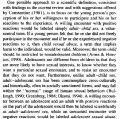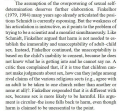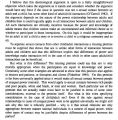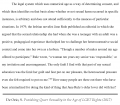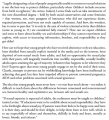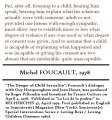Debate Guide: Power disparity: Difference between revisions
(New page: "Power disparity" or "Unlevel playing field" argument: :''"The child or adolescent is almost invariably in a position of lesser physical power and status. Considering this, any sexual con...) |
The Admins (talk | contribs) No edit summary |
||
| (34 intermediate revisions by 3 users not shown) | |||
| Line 1: | Line 1: | ||
"Power disparity" or "Unlevel playing field" argument: | __NOTOC__[[Image:Youth and suitors.jpg|thumb|right|250px|'''Youth conversing with suitors'''<br>Miniature illustration from the ''Haft Awrang'' of Jami, in the story ''A Father Advises his Son About Love.'' Freer and Sackler Galleries, Smithsonian Institution, Washington, DC.]]"'''Power disparity'''" or "'''Unlevel playing field'''" argument: | ||
<blockquote><font color="green">'''''The child or adolescent is invariably in a <u>position of lesser social or physical power/status.</u> Considering this, any sexual contact will function only in the interests of the more powerful partner, and this is why we call it abuse.'''''</font></blockquote> | |||
1. If your opponent's intent is to use this argument to defend [[Age of Consent]] laws, you will have to explain how it would apply to instances in which the youth has more physical, financial, institutional or bargaining power than the older person. [https://www.boywiki.org/en/Historical_boylove_relationships Many such examples have existed throughout history], and [[Accounts and Testimonies|closer to the present]]. | |||
2. We have to consider whether there ''is in fact a gap'', and whether or not there may be power differentials favoring ''both sides'' in different ways. While an adult may excel in physical power, they have [[Power of consequences|not a leg to stand on legally.]] Since they could be put in a jail cell under suspicion of unlawful sex with a minor within hours, it is the "minor" who has the power of perceived victimhood. So, much of a minor's [[Power of attraction|power over an adult]] is covert in nature - we can perhaps point to [[Michel Foucault]] for examples of how this power is manifested. It could also be said in layman's terms, that most parents will know deep down, even the youngest child can always say 'no' - often in the most expressive of ways. In this instance, one would have to explain the ''mechanism'' by which physical relations negate this strength of will. | |||
If the adult, on the other hand is using threats to subvert the minor's power, then we are witnessing a clear-cut [[Special Article: Adverse effects of hysteria|adverse consequence]] of [[Debate Guide: Problems with the Age of Consent|age of consent laws]], and should really be considering the extent to which these laws are causing psychological tensions and harm to both parties. | |||
3. Since we are not a ''savage species'' at the personal level, the presence of a natural power gap in no way means that it will be abused. As a youth - lover (in a literal sense) an ''[[Minor Attracted Person|MAP]]'', if and when they feel a physical attraction, will desire to please and receive pleasure from their partner, like an adult-attracted person would. Any number of [[Research: Psychopathy_and_abnormal psychology|research articles]] relating to pedophilia (the only form of attraction to minors which is officially pathologized) will confirm this. This is in contrast to a "situational sex offender" who might simply be taking advantage of the ''proximity'' or ''convenience'' of a minor, whilst using the taboo nature of the act to instill fear of exposure. Psychopathic crimes are of course a completely different class from the aforementioned two, and thankfully very rare. We have to recognize that in any instance, these and other abuses of power causing unavoidable physical and psychological harms in situ would remain against the law, regardless of what [[consent]] laws were being used. | |||
4. Finally, while abuse of power (beatings, bullying by adults or other minors) can not be excused, it is perpetrated daily against children without any apparent physical or psychological harm. Acknowledging this fact isn't a taboo as such - we just ignore the abuses of power to justify them, and thus skirt around the issue as there is no considerable societal stigma on violence or discipline. So what if we were to remove the societal stigma on erotic play, if consented to? | |||
Furthermore, in playground games (seen by developmental psychologists as "crucial socializing experiences") and at bath time for example, small children are effectively "felt up" against their will, repeatedly and in ways only deemed indefensible when certain "motives" are identified. Even when applied to very small children, these interactions are never seen or expected to cause mental torture, nor to have lifelong consequences. Thus, with respect to consensual sex play, the view that harms are inevitable is totally unwarranted and only risks becoming a dangerous, [[self-fulfilling prophecy]] based on moral hysteria and reactionism. | |||
Whilst there ''is'' a clear hypocrisy in the way we celebrate and encourage non-consensual play among/discipline of "our" children, we should also ask about the social context, i.e. are we creating the need to protect children or minors in general? The [[Debate Guide: Cyclical Paternalism|cyclical paternalism]] argument will help address this. | |||
==Stockholm Syndrome== | |||
[[File:Stockholm.png|thumb|About Stockholm Syndrome]] | |||
Stockholm Syndrome is often applied to adult-minor relationships in social media debates that touch upon the power disparity argument - and has been used to support victim narratives in general.<ref>[https://web.archive.org/web/20211206080728/https://sci-hub.se/10.1111/j.1533-8525.2012.01241.x STOCKHOLM SYNDROME AS VERNACULAR RESOURCE]</ref> We describe it as absurd and well past its sell-by-date, because it takes a theory originally intended for ''actual hostages/abductees'' and tries to apply it to personal relationships, sometimes even ''years after the fact''. | |||
This particular argument is of course encountered by people who argue from experience, claiming they had positive encounters with an adult as a minor, absent PTSD. Armchair diagnosis of Stockholm Syndrome (better characterized as disrespectful [[wikipedia:Gaslighting|gaslighting]]) is invariably attempted by those with ''no qualifications in psychology or mental health'' whatsoever. As can be seen from our [[Accounts and Testimonies|accounts section]], many adults point out they were the ones with the real power; the [[Power of attraction|power of attraction]] and the ironic bargaining [[Power of consequences|power given to them by their perceived victimhood]] as the "minor". | |||
The Stockholm Syndrome argument would also have to be applied to countless examples of relationships because positive recall is so common. If it were the case, our [[Research: Prevalence of Harm and Negative Outcomes|surveys and studies]] would suggest that due to their generally positive or neutral recall, a majority of boys were in some way mental captives of their "abusers". At the same time, these very same techniques would have to be held as rarely ever working on girls, or at least not attempted by the adult for some reason. This is because girls more often later recall their experiences as abusive or negative (despite non-significant psychological adjustment outcomes). With females who experienced sexual debut as adult women providing similar negative reactions, we would have to explain why the syndrome does not apply to them. | |||
Ultimately, if the young were inherently prone to Stockholm Syndrome, there would be no need for parenting behavioral experts who profess "special knowledge" re. controlling "unruly" youngsters. | |||
==Egalitarian?== | |||
It's a convenient and oft-repeated myth that present [[Child Sexual Abuse|CSA]] praxis is inherently egalitarian - even somehow libertarian, "freeing" minors from adult power. We convince ourselves that protecting minors way into their teens is somehow necessary because "liberal-democratic society" is ''always progressing''; thus we are only now beginning to learn of a dark and hidden history of abuse. This sounds poetic and virtuous, a revelation even, but just doesn't check out against the evidence. It is very easy to establish the modern roots of CSA were in fact [[moral entrepreneur]]s, religious puritanist zealots and "child savers" such as [[Judianne Densen-Gerber]]. This movement initially amplified the witch-hunt in the 1970s, elevating the "sexual predator" and the "trafficked child" to the level of media spectacle. Feminists and psychiatrists then filled the gaps left in what evolved to become highly profitable public discourse during the post-AIDS conservative backlash. | |||
Further, when we trace these recurring panics back in time (there have been around three so far), we find exactly the same circus of moral righteousness ''preceding'' any illusion of objective scientific method or progressivist virtue. The misogyny goes all the way back to the well-documented child prostitution panics in the Victorian era, caused by a moral crisis in post-industrial society. Then in the postwar era, "child molester" panics were centered on the predatory homosexual. | |||
Regardless of its cause, the results of this "egalitarian" sex stigma are plain to see: | |||
*The taboo on underage sex targets girls unfairly; for example in most studies, boys seem almost immune to the stigma - recalling their experiences neutrally or positively.<ref>https://www.ipce.info/library_3/rbt/ma_11.htm#Gender3</ref> Girls on the other hand, are exposed to more forceful contacts, and the emotional terminology women have used to recall their early experiences is highly indicative of mysogynistic post-event conditioning. | |||
*CSA theory is in essence an over-reaction to deeply entrenched misogynistic practices in society. Modern CSA praxis has an inherent contradiction insofar as this counter-reaction is so severe, it amplifies and excuses misogyny by providing a nativist explanation for the traumas it causes. We should still not forget that both genders suffer from its effects, since CSA is a monolithic belief system that draws false authority from its supposedly liberal-egalitarian underpinnings. | |||
==Excerpt Graphic Library== | |||
The EGL on '''Consent''' has some relevant information. Just right click/save and reproduce by uploading in short-form media to bypass character limits. | |||
{{Template:EGLConsent}} | |||
==See also== | ==See also== | ||
*'''Against:''' [[Debate Guide: Cognitive ability|Cognitive ability]] - Some argue that sexual | *'''Against:''' [[Debate Guide: Cognitive ability = consent|Cognitive ability]] - Some argue that effective consent to sexual acts is reliant upon "adult" levels of cognition. | ||
*[[Debate Guide: Cyclical paternalism|Cyclical Paternalism]] - A sociological argument related to power disparity. | |||
==External links== | |||
*[https://en.wikipedia.org/wiki/Gaslighting Gaslighting] - Apply selectively to Stockholm Syndrome diagnosis by a civilian or practitioner. | |||
==References== | |||
[[Category:Debate]][[Category:Debating Points: Sociological]][[Category:Debating Points: Adult-Minor sex]] | [[Category:Debate]][[Category:Debating Points: Sociological]][[Category:Debating Points: Adult-Minor sex]] | ||
Latest revision as of 22:35, 12 April 2024
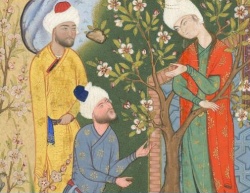
Miniature illustration from the Haft Awrang of Jami, in the story A Father Advises his Son About Love. Freer and Sackler Galleries, Smithsonian Institution, Washington, DC.
"Power disparity" or "Unlevel playing field" argument:
The child or adolescent is invariably in a position of lesser social or physical power/status. Considering this, any sexual contact will function only in the interests of the more powerful partner, and this is why we call it abuse.
1. If your opponent's intent is to use this argument to defend Age of Consent laws, you will have to explain how it would apply to instances in which the youth has more physical, financial, institutional or bargaining power than the older person. Many such examples have existed throughout history, and closer to the present.
2. We have to consider whether there is in fact a gap, and whether or not there may be power differentials favoring both sides in different ways. While an adult may excel in physical power, they have not a leg to stand on legally. Since they could be put in a jail cell under suspicion of unlawful sex with a minor within hours, it is the "minor" who has the power of perceived victimhood. So, much of a minor's power over an adult is covert in nature - we can perhaps point to Michel Foucault for examples of how this power is manifested. It could also be said in layman's terms, that most parents will know deep down, even the youngest child can always say 'no' - often in the most expressive of ways. In this instance, one would have to explain the mechanism by which physical relations negate this strength of will.
If the adult, on the other hand is using threats to subvert the minor's power, then we are witnessing a clear-cut adverse consequence of age of consent laws, and should really be considering the extent to which these laws are causing psychological tensions and harm to both parties.
3. Since we are not a savage species at the personal level, the presence of a natural power gap in no way means that it will be abused. As a youth - lover (in a literal sense) an MAP, if and when they feel a physical attraction, will desire to please and receive pleasure from their partner, like an adult-attracted person would. Any number of research articles relating to pedophilia (the only form of attraction to minors which is officially pathologized) will confirm this. This is in contrast to a "situational sex offender" who might simply be taking advantage of the proximity or convenience of a minor, whilst using the taboo nature of the act to instill fear of exposure. Psychopathic crimes are of course a completely different class from the aforementioned two, and thankfully very rare. We have to recognize that in any instance, these and other abuses of power causing unavoidable physical and psychological harms in situ would remain against the law, regardless of what consent laws were being used.
4. Finally, while abuse of power (beatings, bullying by adults or other minors) can not be excused, it is perpetrated daily against children without any apparent physical or psychological harm. Acknowledging this fact isn't a taboo as such - we just ignore the abuses of power to justify them, and thus skirt around the issue as there is no considerable societal stigma on violence or discipline. So what if we were to remove the societal stigma on erotic play, if consented to?
Furthermore, in playground games (seen by developmental psychologists as "crucial socializing experiences") and at bath time for example, small children are effectively "felt up" against their will, repeatedly and in ways only deemed indefensible when certain "motives" are identified. Even when applied to very small children, these interactions are never seen or expected to cause mental torture, nor to have lifelong consequences. Thus, with respect to consensual sex play, the view that harms are inevitable is totally unwarranted and only risks becoming a dangerous, self-fulfilling prophecy based on moral hysteria and reactionism.
Whilst there is a clear hypocrisy in the way we celebrate and encourage non-consensual play among/discipline of "our" children, we should also ask about the social context, i.e. are we creating the need to protect children or minors in general? The cyclical paternalism argument will help address this.
Stockholm Syndrome
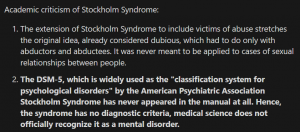
Stockholm Syndrome is often applied to adult-minor relationships in social media debates that touch upon the power disparity argument - and has been used to support victim narratives in general.[1] We describe it as absurd and well past its sell-by-date, because it takes a theory originally intended for actual hostages/abductees and tries to apply it to personal relationships, sometimes even years after the fact.
This particular argument is of course encountered by people who argue from experience, claiming they had positive encounters with an adult as a minor, absent PTSD. Armchair diagnosis of Stockholm Syndrome (better characterized as disrespectful gaslighting) is invariably attempted by those with no qualifications in psychology or mental health whatsoever. As can be seen from our accounts section, many adults point out they were the ones with the real power; the power of attraction and the ironic bargaining power given to them by their perceived victimhood as the "minor".
The Stockholm Syndrome argument would also have to be applied to countless examples of relationships because positive recall is so common. If it were the case, our surveys and studies would suggest that due to their generally positive or neutral recall, a majority of boys were in some way mental captives of their "abusers". At the same time, these very same techniques would have to be held as rarely ever working on girls, or at least not attempted by the adult for some reason. This is because girls more often later recall their experiences as abusive or negative (despite non-significant psychological adjustment outcomes). With females who experienced sexual debut as adult women providing similar negative reactions, we would have to explain why the syndrome does not apply to them.
Ultimately, if the young were inherently prone to Stockholm Syndrome, there would be no need for parenting behavioral experts who profess "special knowledge" re. controlling "unruly" youngsters.
Egalitarian?
It's a convenient and oft-repeated myth that present CSA praxis is inherently egalitarian - even somehow libertarian, "freeing" minors from adult power. We convince ourselves that protecting minors way into their teens is somehow necessary because "liberal-democratic society" is always progressing; thus we are only now beginning to learn of a dark and hidden history of abuse. This sounds poetic and virtuous, a revelation even, but just doesn't check out against the evidence. It is very easy to establish the modern roots of CSA were in fact moral entrepreneurs, religious puritanist zealots and "child savers" such as Judianne Densen-Gerber. This movement initially amplified the witch-hunt in the 1970s, elevating the "sexual predator" and the "trafficked child" to the level of media spectacle. Feminists and psychiatrists then filled the gaps left in what evolved to become highly profitable public discourse during the post-AIDS conservative backlash.
Further, when we trace these recurring panics back in time (there have been around three so far), we find exactly the same circus of moral righteousness preceding any illusion of objective scientific method or progressivist virtue. The misogyny goes all the way back to the well-documented child prostitution panics in the Victorian era, caused by a moral crisis in post-industrial society. Then in the postwar era, "child molester" panics were centered on the predatory homosexual.
Regardless of its cause, the results of this "egalitarian" sex stigma are plain to see:
- The taboo on underage sex targets girls unfairly; for example in most studies, boys seem almost immune to the stigma - recalling their experiences neutrally or positively.[2] Girls on the other hand, are exposed to more forceful contacts, and the emotional terminology women have used to recall their early experiences is highly indicative of mysogynistic post-event conditioning.
- CSA theory is in essence an over-reaction to deeply entrenched misogynistic practices in society. Modern CSA praxis has an inherent contradiction insofar as this counter-reaction is so severe, it amplifies and excuses misogyny by providing a nativist explanation for the traumas it causes. We should still not forget that both genders suffer from its effects, since CSA is a monolithic belief system that draws false authority from its supposedly liberal-egalitarian underpinnings.
Excerpt Graphic Library
The EGL on Consent has some relevant information. Just right click/save and reproduce by uploading in short-form media to bypass character limits.
-
Bruce Rind on CSA concept (in)validity
-
Rind on lack of predictive validity for informed consent/CSA concept invalidity
-
Rind - CSA concept invalidity continued
-
David Finkelhor (Abuse Guru) and his failed moral circular argument
-
Robert Ehman on the failed circular "consent" argument
-
Robert Ehman on the real reasons for consent vs no consent binarism
-
Terry Leahy: Absence of an ethical argument against age-gap sex
-
Paul Okami on Power Imbalance argument (from Peer Commentaries on Green (2002) and Schmidt (2002))
-
Review of Sandfort and consent
-
Scott De Orio on Queer Identities that don't fit the model of consent
-
Liz Highleyman's review of Judith Levine's Harmful to Minors
-
Liz Highleyman's review of Judith Levine's Harmful to Minors: Consent dogma
-
Foucault, 1978
See also
- Against: Cognitive ability - Some argue that effective consent to sexual acts is reliant upon "adult" levels of cognition.
- Cyclical Paternalism - A sociological argument related to power disparity.
External links
- Gaslighting - Apply selectively to Stockholm Syndrome diagnosis by a civilian or practitioner.


